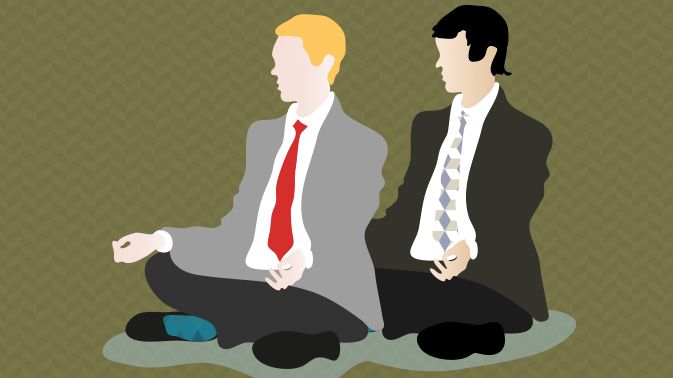Dr. Britta Hölzel
PromotionBritta Hölzel studierte Psychologie an der Goethe Universiutät Frankfurt und absolvierte zusätzlich Weiterbildungen im Bereich "Mindfulness-Based Stress Reduction" (MBSR) sowie als Yogalehrerin. Sie selbst entdeckte Yoga in einem indischen Ashram. Seither fasziniert sie die Entspannungstechnik auch aus neurowissenschaftlicher Sicht. Bisher führte sie ihre Forschung am Massachusetts General Hospital/Harvard Medical School in Boston, USA, am Bender Institute of Neuroimaging der Justus Liebig Universität in Gießen und am psychologischen Institut der Charité in Berlin durch.
Arbeitsschwerpunkt:
Klinische Neurowissenschaften, Kognitive Neurowissenschaften
Abschluss:
Promotion
Position / Tätigkeit:
wissenschaftliche Mitarbeiterin
Homepage:
http://www.brittahoelzel.de
Gard, T., Taquet, M., Dixit, R., Hölzel, B.K., Dickerson, B.C., & Lazar, S.W. (2015) Greater widespread functional connectivity of the caudate in older adults who practice kripalu yoga and vipassana meditation than in controls. Frontiers in Human Neuroscience, 9:137. doi: 10.3389/fnhum.2015.00137
Tang, Y.-Y., Hölzel, B.K., & Posner, M.I. (2015). The neuroscience of mindfulness meditation. Nature Reviews Neuroscience, 16, 213-225.
Gard, T., Taquet, M., Dixit, R., Hölzel, B.K., de Montjoye, Y.-A., Brach, N., Salat, D., Dickerson, B.C., Gray, J.R., & Lazar, S. (2014). Fluid intelligence and brain functional organization in aging yoga and meditation practitioners. Frontiers in Aging Neuroscience.
Singleton, O., Hölzel, B.K., Vangel, M., Brach, N., Carmody, J., & Lazar, S.W. (2014). Change in brainstem gray matter concentration following a mindfulness-based intervention is correlated with improvement in psychological well-being. Frontiers in Human Neuroscience.
Desbordes, G., Gard, T., Hoge, E.A., Hölzel, B.K., Kerr, C., Lazar, S.W., Olendzki, A., & Vago, D. (2014). Moving beyond mindfulness: Defining equanimity as an outcome measure in meditation and contemplative research. Mindfulness.
Gard, T., Hölzel, B.K., & Lazar, S. (2014). The potential effects of meditation on age-related cognitive decline : A systematic review. Annals of the New York Academy of Sciences. 1307 (1), 89?103.
Hoge, E.A., Hölzel, B.K., Marques, L., Metcalf, C., Brach, N., Lazar, S.W., & Simon, N.M. (2013). Mindfulness and Self-Compassion in Generalized Anxiety Disorder; Examining Predictors of Disability. Evidence-Based Complementary and Alternative Medicine, doi :10.1155/2013/576258
Hölzel, B.K., Hoge, E.A., Greve, D.N., Gard, T., Creswell, J.D., Brown, K.W., Barrett, L.F., Vaitl, D., & Lazar, S. (2013). Neural mechanisms of symptom improvements in generalized anxiety disorder following mindfulness meditation training. NeuroImage : Clinical, 2, 448-458.
Gard, T., Brach, N., Hölzel, B.K., Noggle, J. J., Conboy, L. A., & Lazar, S. W. (2012). Effects of a yoga-based intervention for young adults on quality of life and perceived stress: The potential mediating roles of mindfulness and self-compassion. The Journal of Positive Psychology, 7(3), 165-175.
Deckersbach, T., Hölzel, B.K., Eisner, L.R., Stange, J.P., Peckham, A.D., Lazar, S.W., Daugherty, D.D., Rauch, S.L., Nierenberg, A.A. (2012). Mindfulness-based cognitive therapy for non-remitted patients with bipolar disorder. CNS Neuroscience & Therapeutics, 18(2), 133-141.
Gard, T., Hölzel, B.K., Sack, A.T., Hempel, H., Lazar, S.W., Vaitl, D., & Ott, U. (2012). Pain attenuation through mindfulness is associated with decreased cognitive control and increased sensory processing in the brain. Cerebral Cortex, 22(11), 2692-2702.
Hölzel, B.K., Carmody, J., Vangel, M., Congleton, C., Yerramsetti, S.M., Gard, T., Lazar, S.W. (2011). Meditation practice leads to increases in regional brain gray matter concentration. Psychiatry Research: Neuroimaging, 191, 36-42.
Hölzel, B.K., Lazar, S.W., Gard, T., Schuman-Olivier, Z., Vago, D.R., & Ott, U. (2011). How does mindfulness meditation work? Proposing mechanisms of action from a conceptual and neural perspective. Perspectives on Psychological Science, 6, 537-559.
Stange, J.P., Eisner, L.R., Hölzel, B.K., Peckham, A.D., Dougherty, D.D., Rauch, S.L., Nierenberg, A.A., Lazar, S.W., & Deckersbach, T. (2011). Mindfulness-based cognitive therapy for bipolar disorder: Effects on cognitive functioning. Journal of Psychiatric Practice, 17(6), 410-419.
Hölzel, B.K., Carmody, J., Evans, K.C., Hoge, E.A., Dusek, J.A., Morgan, L., Pitman, R.K., & Lazar, S.W. (2010). Stress reduction correlates with structural changes in the amygdala. Social Cognitive and Affective Neuroscience, 5, 11-17.
Hölzel, B.K., Ott, U., Gard, T., Hempel, H., Weygandt, M., Morgen, K., & Vaitl, D. (2008). Investigation of mindfulness meditation practitioners with voxel-based morphometry. Social Cognitive and Affective Neuroscience, 3, 55?61.
Hölzel, B.K., Ott, U., Hempel, H., Hackl, A., Wolf, K., Stark, R., & Vaitl, D. (2007). Differential engagement of anterior cingulate and adjacent medial frontal cortex in adept meditators and non-meditators. Neuroscience Letters, 421, 16?21.
Hartig, J., Hölzel, B., & Moosbrugger, H. (2007). A confirmatory analysis of item reliability trends (CAIRT): Differentiating true score and error variance in the analysis of item context effects. Multivariate Behavioral Research, 42, 157?183.
Hölzel, B.K. & Ott, U. (2006). Relationships between meditation depth, absorption, meditation practice, and mindfulness: A latent variable approach. Journal of Transpersonal Psychology, 38, 179?199.
Badenschier, F.: Ängste wegmeditieren. Deutschlandfunk, 17. 04. 2013
http://www.deutschlandfunk.de/aengste-wegmeditieren.676.de.html?dram:article_id=243761
Interview mit Britta Hölzel: Wenn das Gehirn meditiert.
http://www.arbor-seminare.de/wenn-das-gehirn-meditiert
Interview: Das Gehirn folgt unseren Gewohnheiten (Meditation und das alternde Gehirn). Tibet und Buddhismus, 4/2012
http://www.nmr.mgh.harvard.edu/~britta/int-holzel-TiBu103.pdf
Britta Hölzel: ?Die große Achtsamkeitsbox?. Bodyscans,
Meditationen, Yoga auf CD + DVD (5w-Verlag)
Britta Hölzel und Christine Brähler (Hrsg). Achtsamkeit mitten im Leben - Anwendungsgebiete und wissenschaftliche Perspektiven. O.W. Barth Verlag.

Technische Universität München
UniklinikInstitut:
Klinikum rechts der Isar | Neuro-Kopf-Zentrum | Abteilung für Diagnostische und Interventionelle Neuroradiologie
Arbeitsschwerpunkt:
Klinische Neurowissenschaften, Kognitive Neurowissenschaften
Anschrift:
Ismaninger Str. 22
81675 München
DE
Telefon:
(089) 4140 7967
E-Mail:
britta.hoelzel@tum.de
